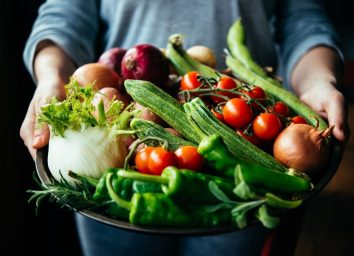The #1 Surprising Reason You Need To Eat More Vegetables, Says Dietitian

Vegetables are ironically America’s least eaten, but most recommended healthy food group. The Dietary Guidelines for Americans 2020-2025, along with MyPlate guidance, recommend adults following a 2,000-calorie diet consume 2½ cups of vegetables per day at a minimum. Unfortunately, a staggering 90 percent of us don’t hit this recommendation. One serving equates to two cups of raw leafy greens or just one cup of all other fresh, frozen, or canned vegetables.
Nutrition experts suspect that two primary reasons vegetables might be under-consumed are because of taste and convenience. When considering all produce, vegetables tend to have a bitter taste compared to the sweetness of fruits. Vegetables also usually are not eaten alone but instead enjoyed after cooking or preparing them, which increases the amount of time from the refrigerator, pantry, or freezer, to the plate. Furthermore, vegetables are less commonplace in the restaurant setting: they are seldom found on fast-food menus and aren’t a top priority for casual dining offerings. This creates a small, but meaningful, barrier to achieving optimal vegetable intake.
So why should you make a point of overcoming these minor obstacles to eat more vegetables? Research indicates that various vegetables offer advanced protection against chronic disease, so it is critical for you to have these in your diet. This disease-protecting effect is amplified when we choose a variety of vegetables every day that include a diverse assortment of colors and types. This has been demonstrated repeatedly through a mix of systematic reviews, meta-analyses, observational studies, and interventional studies.
Read on for some major chronic diseases which might be prevented, delayed, or controlled through adequate vegetable intake, and for more on how to eat healthy, don’t miss The #1 Best Juice to Drink Every Day, Says Science.
Heart disease

Heart disease remains the #1 cause of death in the United States, according to 2019 data. A 2018 meta-analysis of 69 prospective studies in the American Journal of Clinical Nutrition found that a higher dietary intake and/or blood concentrations of vitamin C, carotenoids, and alpha-tocopherol (a form of vitamin E) was associated with reduced cardiovascular disease, cancer, and all-cause mortality. These nutrients and compounds are normally more abundant with adequate vegetable intake. Vegetables are also typically good sources of potassium, which is linked to better blood pressure control.
Cancer

Well-respected cancer organizations like the American Cancer Society (ACS) and the American Institute for Cancer Research (AICR) advocate for increased vegetable consumption. The AICR has developed a “New American Plate” concept that encourages a plant-based diet approach, including two-thirds of every meal as fruits, vegetables, whole grains, and beans. The ACS credits vegetables for likely reducing cancer risk thanks to vitamin, mineral, and fiber content, along with the high water and low-calorie contribution of vegetables which assists with weight management efforts.
Type 2 diabetes

In 2019, 1.4 million new cases of diabetes were diagnosed, and it is predicted that 1.5 million people will be diagnosed with diabetes in 2022. It is critical to understand what eating habits could help stop this momentum in its tracks. A 2016 meta-analysis in the Journal of Diabetes Investigation included an examination of 23 articles and found a higher intake of green leafy vegetables, yellow vegetables, cruciferous vegetables, or their fiber was associated with a lower risk of type 2 diabetes. A promising nutrition message for people with diabetes is to eat a consistent quantity of carbohydrates, consume generous amounts of fiber, include fruits and vegetables regularly in the diet, and avoid excess added sugar.
Chronic kidney disease

Another meta-analysis, this time featured in the Clinical Journal of the American Society of Nephrology in 2019, identified 18 prospective cohort studies and found a healthy dietary pattern, including diets that encouraged high vegetable consumption, was associated with a lower incidence of chronic kidney disease. The National Kidney Foundation urges higher intakes of plant-based foods such as vegetables to help prevent and slow the progression of chronic kidney disease.









